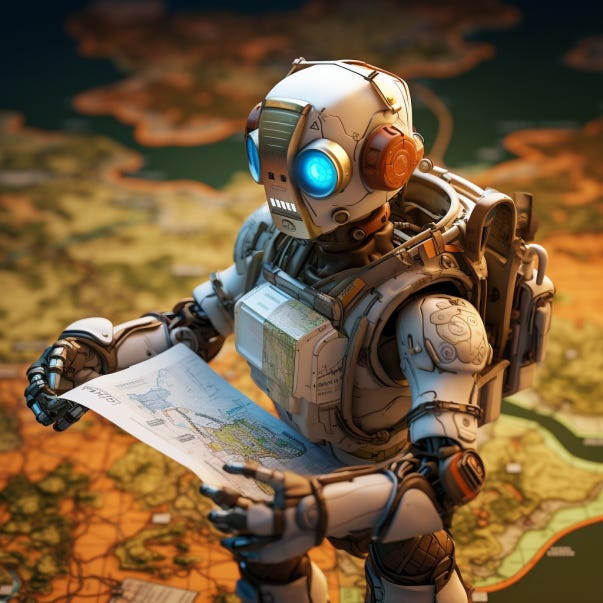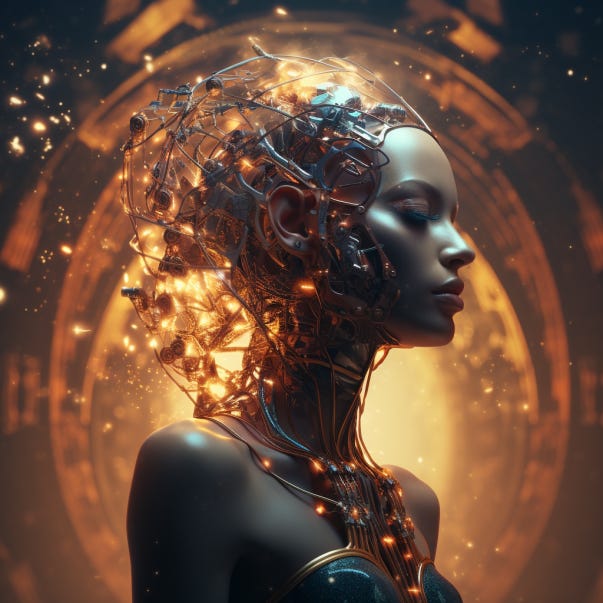Collaborating with AI: Boosting Creativity and Productivity
Exploring the synergy of humans and AI in writing, programming, and data analysis
The rise of AI (cue the Terminator music), particularly in the realm of content creation, has sparked a whirlwind of reactions. Remember when spell-checkers and auto correct became standard in our word processors? Many thought they'd ruin our spelling abilities forever. Jump back a few decades, and people debated whether calculators would make us forget basic math. Even further back, the invention of the printing press sparked concerns about sidelining human scribes. Yet, in each case, these tools didn't replace us; they became extensions of our capabilities. Today, as AI takes center stage, it's not about letting machines "do all the work."
This piece will explore how you can collaborate with AI in writing, programming, and data analysis, emphasizing that with AI as a partner, you're equipped to reach new heights of innovation and creativity.
Bridging the Gap: AI as a Co-Creator
Think of AI, like ChatGPT, not as a replacement, but rather as a trusty sidekick. Just as Batman has Robin, Sherlock has Watson, and even chefs have sous chefs, AI can be your trusted ally, enhancing and elevating your work.
Writing
When crafting a novel, article, or report, it's common to hit a wall, experiencing the dreaded writer's block. ChatGPT can step in, offering a fresh perspective or suggesting a twist you hadn't thought of. It's not about it crafting the story for you, but rather giving you that little nudge or inspiration you need. And let's not forget its utility in brainstorming sessions, generating a plethora of ideas in mere seconds.
For a detailed look at how this plays out in practice, check out some of these previous articles on prompts.finance:
Programming
In the realm of coding, a software developer often finds themselves stumped over a bug or looking for the most efficient way to structure their code. Enter AI-powered tools. With the right prompt, ChatGPT can offer suggestions, alternatives, or even identify areas in your code that could be causing an issue. It's like having a second pair of expert eyes, always ready to help.
Check out these articles where we pair up with ChatGPT to write some code and solve real problems:
Data Analysis
For analysts and researchers, diving deep into a sea of data can sometimes be overwhelming. AI can swiftly sort through vast datasets, pinpointing patterns that might escape even the most trained human eyes. But it doesn't end there; once AI highlights these patterns, it's up to the human analyst to interpret them, weave a story around them, and make the critical decisions.
Here are a few popular posts where we pair up with ChatGPT to analyze data:
Simplifying Property Market Analysis with ChatGPT - A No-Code Approach
Leveraging AI in Commercial Real Estate: A Look at Predictive Analytics
In each scenario, AI doesn't overshadow the human touch. Instead, it complements it. It's about the partnership, the dance between human intuition and AI's computational power. By embracing AI as a co-creator, we're not ceding control or outsourcing our brains; we're merely tapping into a resource that can make our outputs sharper, richer, and more nuanced.
Addressing Reservations and Embracing the Future
Despite the obvious advantages, many still harbor reservations about integrating AI into their daily workflows. These concerns often stem from misunderstandings or fear of the unknown. Let's address some of the most common reservations:
"AI will replace my job."
In my role as the CTO of a financial services company, this question is frequently posed to me, especially from programmers. “Will there be a place for me in the industry in five years?” I often tell them to look closer, to think not about 5 years, but about the here and now. If you aren't harnessing tools like ChatGPT or Co-Pilot, you're not just jeopardizing your future relevance; you're missing out on present-day advancements.

These tools aren't about replacing you; they're about enhancing your capabilities and multiplying your productivity. The real risk? Stagnating while the world races forward.
"Relying on AI makes us less intelligent."
History often teaches us that embracing innovation doesn't diminish our abilities, but rather amplifies them. Consider the invention of maps; they didn't compromise our innate sense of direction but enabled us to venture into previously unknown terrains. In the same vein, integrating AI into our workflows doesn't stifle our intelligence but allows us to push the boundaries, enabling us to grapple with more intricate challenges.
Dive deeper into this notion in our previous post, Supercharging Learning and Personal Growth with ChatGPT. (With all these references, I'm starting to feel like we're in a Simpsons clip show!) Every interaction I have with ChatGPT is a testament to its potential in personal growth. Whether it's unveiling a fresh optimization trick or enlightening me on a novel subject, it feels like stepping closer to a more refined version of myself.
"AI lacks the human touch."
Absolutely, and that's why it's a co-creator, not a sole creator. The human element—empathy, intuition, emotion—cannot be replicated by machines. While AI can process information and suggest outputs, it's the human who adds soul, perspective, and nuance.
Looking ahead, as the lines between AI and our daily tasks continue to blur, it's vital to approach this transition with an open mind. Instead of resisting change, embrace the possibilities. When humans and AI collaborate, the results can be transformative, pushing the boundaries of what we once thought possible.
Hitting the High Note: Embracing the Future
We started off addressing three primary apprehensions: the fear of AI usurping our roles, the misconception that leaning on AI dilutes our intellect, and the concern that AI can't replicate the human touch. These worries, while understandable, often stem from a place of resistance to change, a hesitancy rooted in the unknown.
However, history has consistently shown that every transformative tool or technology has faced its share of skeptics. The printing press, the calculator, even the internet — all were met with doubts, only to eventually become indispensable parts of our lives.
The crucial pivot is in the perspective. Instead of viewing AI as a threat, recognize it as an amplifier. Rather than seeing it as a crutch that makes us "less", envision it as a tool that elevates our capabilities. And instead of pining for the purely human touch, appreciate the harmony achieved when human intuition dances with AI's precision.
As we head into an ever-accelerating digital age, it's not about battling the tide, but learning how to surf it expertly. The question isn't "How can I prevent AI from taking over?" but rather, "How can I partner with AI to become the best version of myself?"
Embracing AI as a co-creator, as a partner in innovation, is more than just staying relevant. It's about pioneering new paths, exploring uncharted territories, and pushing the boundaries of what's possible. It's not about fearing the future but owning it. And in that spirit, let's not just adjust to the AI era — let's thrive in it.
Happy Prompting!





